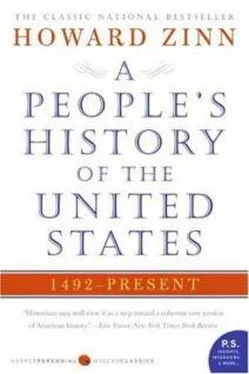Howard Zinn - A People
Здесь есть возможность читать онлайн «Howard Zinn - A People» весь текст электронной книги совершенно бесплатно (целиком полную версию без сокращений). В некоторых случаях можно слушать аудио, скачать через торрент в формате fb2 и присутствует краткое содержание. Издательство: Harper-Collins, Жанр: Фэнтези, на английском языке. Описание произведения, (предисловие) а так же отзывы посетителей доступны на портале библиотеки ЛибКат.
- Название:A People
- Автор:
- Издательство:Harper-Collins
- Жанр:
- Год:неизвестен
- ISBN:нет данных
- Рейтинг книги:4 / 5. Голосов: 1
-
Избранное:Добавить в избранное
- Отзывы:
-
Ваша оценка:
- 80
- 1
- 2
- 3
- 4
- 5
A People: краткое содержание, описание и аннотация
Предлагаем к чтению аннотацию, описание, краткое содержание или предисловие (зависит от того, что написал сам автор книги «A People»). Если вы не нашли необходимую информацию о книге — напишите в комментариях, мы постараемся отыскать её.
A People — читать онлайн бесплатно полную книгу (весь текст) целиком
Ниже представлен текст книги, разбитый по страницам. Система сохранения места последней прочитанной страницы, позволяет с удобством читать онлайн бесплатно книгу «A People», без необходимости каждый раз заново искать на чём Вы остановились. Поставьте закладку, и сможете в любой момент перейти на страницу, на которой закончили чтение.
Интервал:
Закладка:
When he arrived on Hispaniola in 1508, Las Casas says, "there were 60,000 people living on this island, including the Indians; so that from 1494 to 1508, over three million people had perished from war, slavery, and the mines. Who in future generations will believe this? I myself writing it as a knowledgeable eyewitness can hardly believe it…"
Thus began the history, five hundred years ago, of the European invasion of the Indian settlements in the Americas. That beginning, when you read Las Casas-even if his figures are exaggerations (were there 3 million Indians to begin with, as he says, or less than a million, as some historians have calculated, or 8 million as others now believe?)-is conquest, slavery, death. When we read the history books given to children in the United States, it all starts with heroic adventure-there is no bloodshed-and Columbus Day is a celebration.
Past the elementary and high schools, there are only occasional hints of something else. Samuel Eliot Morison, the Harvard historian, was the most distinguished writer on Columbus, the author of a multivolume biography, and was himself a sailor who retraced Columbus 's route across the Atlantic. In his popular book Christopher Columbus, Mariner, written in 1954, he tells about the enslavement and the killing: "The cruel policy initiated by Columbus and pursued by his successors resulted in complete genocide."
That is on one page, buried halfway into the telling of a grand romance. In the book's last paragraph, Morison sums up his view of Columbus:
He had his faults and his defects, but they were largely the defects of the qualities that made him great-his indomitable will, his superb faith in God and in his own mission as the Christ-bearer to lands beyond the seas, his stubborn persistence despite neglect, poverty and discouragement. But there was no flaw, no dark side to the most outstanding and essential of all his qualities-his seamanship.
One can lie outright about the past. Or one can omit facts which might lead to unacceptable conclusions. Morison does neither. He refuses to lie about Columbus. He does not omit the story of mass murder; indeed he describes it with the harshest word one can use: genocide.
But he does something else-he mentions the truth quickly and goes on to other things more important to him. Outright lying or quiet omission takes the risk of discovery which, when made, might arouse the reader to rebel against the writer. To state the facts, however, and then to bury them in a mass of other information is to say to the reader with a certain infectious calm: yes, mass murder took place, but it's not that important-it should weigh very little in our final judgments; it should affect very little what we do in the world.
It is not that the historian can avoid emphasis of some facts and not of others. This is as natural to him as to the mapmaker, who, in order to produce a usable drawing for practical purposes, must first flatten and distort the shape of the earth, then choose out of the bewildering mass of geographic information those things needed for the purpose of this or that particular map.
My argument cannot be against selection, simplification, emphasis, which are inevitable for both cartographers and historians. But the map-maker's distortion is a technical necessity for a common purpose shared by all people who need maps. The historian's distortion is more than technical, it is ideological; it is released into a world of contending interests, where any chosen emphasis supports (whether the historian means to or not) some kind of interest, whether economic or political or racial or national or sexual.
Furthermore, this ideological interest is not openly expressed in the way a mapmaker's technical interest is obvious ("This is a Mercator projection for long-range navigation-for short-range, you'd better use a different projection"). No, it is presented as if all readers of history had a common interest which historians serve to the best of their ability. This is not intentional deception; the historian has been trained in a society in which education and knowledge are put forward as technical problems of excellence and not as tools for contending social classes, races, nations.
To emphasize the heroism of Columbus and his successors as navigators and discoverers, and to de-emphasize their genocide, is not a technical necessity but an ideological choice. It serves- unwittingly-to justify what was done. My point is not that we must, in telling history, accuse, judge, condemn Columbus in absentia . It is too late for that; it would be a useless scholarly exercise in morality. But the easy acceptance of atrocities as a deplorable but necessary price to pay for progress (Hiroshima and Vietnam, to save Western civilization; Kronstadt and Hungary, to save socialism; nuclear proliferation, to save us all)-that is still with us. One reason these atrocities are still with us is that we have learned to bury them in a mass of other facts, as radioactive wastes are buried in containers in the earth. We have learned to give them exactly the same proportion of attention that teachers and writers often give them in the most respectable of classrooms and textbooks. This learned sense of moral proportion, coming from the apparent objectivity of the scholar, is accepted more easily than when it comes from politicians at press conferences. It is therefore more deadly.
The treatment of heroes (Columbus) and their victims (the Arawaks)-the quiet acceptance of conquest and murder in the name of progress-is only one aspect of a certain approach to history, in which the past is told from the point of view of governments, conquerors, diplomats, leaders. It is as if they, like Columbus, deserve universal acceptance, as if they-the Founding Fathers, Jackson, Lincoln, Wilson, Roosevelt, Kennedy, the leading members of Congress, the famous Justices of the Supreme Court-represent the nation as a whole. The pretense is that there really is such a thing as "the United States," subject to occasional conflicts and quarrels, but fundamentally a community of people with common interests. It is as if there really is a "national interest" represented in the Constitution, in territorial expansion, in the laws passed by Congress, the decisions of the courts, the development of capitalism, the culture of education and the mass media.
"History is the memory of states," wrote Henry Kissinger in his first book, A World Restored , in which he proceeded to tell the history of nineteenth-century Europe from the viewpoint of the leaders of Austria and England, ignoring the millions who suffered from those statesmen's policies. From his standpoint, the «peace» that Europe had before the French Revolution was «restored» by the diplomacy of a few national leaders. But for factory workers in England, farmers in France, colored people in Asia and Africa, women and children everywhere except in the upper classes, it was a world of conquest, violence, hunger, exploitation-a world not restored but disintegrated.
My viewpoint, in telling the history of the United States, is different: that we must not accept the memory of states as our own. Nations are not communities and never have been, The history of any country, presented as the history of a family, conceals fierce conflicts of interest (sometimes exploding, most often repressed) between conquerors and conquered, masters and slaves, capitalists and workers, dominators and dominated in race and sex. And in such a world of conflict, a world of victims and executioners, it is the job of thinking people, as Albert Camus suggested, not to be on the side of the executioners.
Thus, in that inevitable taking of sides which comes from selection and emphasis in history, I prefer to try to tell the story of the discovery of America from the viewpoint of the Arawaks, of the Constitution from the standpoint of the slaves, of Andrew Jackson as seen by the Cherokees, of the Civil War as seen by the New York Irish, of the Mexican war as seen by the deserting soldiers of Scott's army, of the rise of industrialism as seen by the young women in the Lowell textile mills, of the Spanish-American war as seen by the Cubans, the conquest of the Philippines as seen by black soldiers on Luzon, the Gilded Age as seen by southern farmers, the First World War as seen by socialists, the Second World War as seen by pacifists, the New Deal as seen by blacks in Harlem, the postwar American empire as seen by peons in Latin America. And so on, to the limited extent that any one person, however he or she strains, can «see» history from the standpoint of others.
Читать дальшеИнтервал:
Закладка:
Похожие книги на «A People»
Представляем Вашему вниманию похожие книги на «A People» списком для выбора. Мы отобрали схожую по названию и смыслу литературу в надежде предоставить читателям больше вариантов отыскать новые, интересные, ещё непрочитанные произведения.
Обсуждение, отзывы о книге «A People» и просто собственные мнения читателей. Оставьте ваши комментарии, напишите, что Вы думаете о произведении, его смысле или главных героях. Укажите что конкретно понравилось, а что нет, и почему Вы так считаете.












